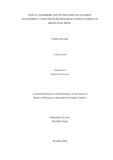
Please use this identifier to cite or link to this item:
https://hdl.handle.net/20.500.14301/491Full metadata record
| DC Field | Value | Language |
|---|---|---|
| dc.contributor.author | Kayastha, Chandni | - |
| dc.date.accessioned | 2025-05-06T02:45:00Z | - |
| dc.date.available | 2025-05-06T02:45:00Z | - |
| dc.date.issued | 2024-12 | - |
| dc.identifier.citation | Kayastha, C.(2024).Ethical leadership and its influence on teachers’ engagement: A post positivist research at public schools in Bhaktapur, Nepal. | en_US |
| dc.identifier.uri | https://hdl.handle.net/20.500.14301/491 | - |
| dc.description.abstract | Ethical leadership is presented as an important element in education, shaping school environments that meet diverse student and community needs. School leaders are expected to transcend mere operational management, embodying integrity and moral accountability in their roles. Concurrently, teacher engagement is recognized as critical, as the motivation and commitment of educators directly influence the quality of education. Despite growing research on school leadership in Nepal, there is a lack of empirical studies exploring how ethical leadership specifically influences teacher engagement in public schools. Existing literature focuses more on governance and administrative challenges, with limited attention to principals’ roles in fostering ethical work environments. This research aims to examine the influence of ethical leadership on teacher engagement within the context of public schools, with a specific focus on principals in the Bhaktapur district. This study adopted a quantitative approach employing a cross sectional survey. The random sampling method was chosen to select a sample of 297 teachers from Bhaktapur district. Data were collected through a structured questionnaire based on validated research instruments and adapted to the Nepali education context. Ethical leadership was examined through three dimensions—care, critique, and justice, while teacher engagement was assessed across vigor, dedication, and absorption. Descriptive statistics, t-test, ANOVA, Welch and Brown Forsythe test and multiple regression were applied for data analysis. Similarly, reliability, validity, and ethical considerations were ensured respectively. The finding shows that justice is at the highest level among the ethical leadership dimensions, while dedication was the most prominent aspect of work engagement. While teachers’ perceptions of care and justice showed no significant differences across background variables consisting of gender, age, working experience and qualification of teachers. Critique varied based on qualification levels, and post hoc analysis showed that the difference was between teachers with intermediate and master’s degrees (p = .022), though the effect size was small (d = 0.17). Gender differences were noted only in absorption with moderate effect (d = 0.28). Regression analysis confirmed that ethical leadership significantly influences teacher engagement with 38% variation. The models explained 41.34% of the variance in vigor, 53.04% in dedication, and 65.85% in absorption. Ethics of care and justice had a positive effect on vigor and dedication, while the ethic of critique had no significant effect. The ethic of justice had the strongest effect on immersion in work, followed by critique. The findings of this study provide valuable insights into ethical leadership and teacher work engagement within the public school system in Nepal, offering potential reference points for future research. This research can contribute significantly to policy formulation concerning the leadership roles of school principals and human resource management in Nepal’s public schools. Additionally, the results can guide future researchers interested in exploring ethical leadership and work engagement in education. Overall, this study highlights the importance of ethical leadership in enhancing teacher engagement, with variations based on teacher qualifications and gender, underscoring its pivotal role in fostering a motivated and committed workforce. | en_US |
| dc.language.iso | en | en_US |
| dc.publisher | Kathmandu University School of Education | en_US |
| dc.title | Ethical Leadership and its Influence on Teachers’ Engagement: A Post Positivist Research at Public Schools in Bhaktapur, Nepal | en_US |
| dc.type | Dissertation | en_US |
| local.school.name | SOED | en_US |
| local.school.department | Department of Development Studies | en_US |
| local.school.program | MPhil in Development Studies | en_US |
| local.school.level | M.Phil. | en_US |
| Appears in Collections: | Dissertations | |
Files in This Item:
| File | Description | Size | Format | |
|---|---|---|---|---|
| Chandni Kayastha_ethical leadership_mphil thesis.pdf | 1.45 MB | Adobe PDF |  View/Open |
Items in DSpace are protected by copyright, with all rights reserved, unless otherwise indicated.